Real Estate
Key Functionalities in Property Management Software Development
March 17, 2025 • 112 Views • 21 min read
Bohdan Vasylkiv
CEO & Co-Founder
Software solutions serve multiple tasks in all existing fields, and the real estate industry is no exception. Advanced real estate management and monitoring are among the most popular reasons to create software product for PropTech.
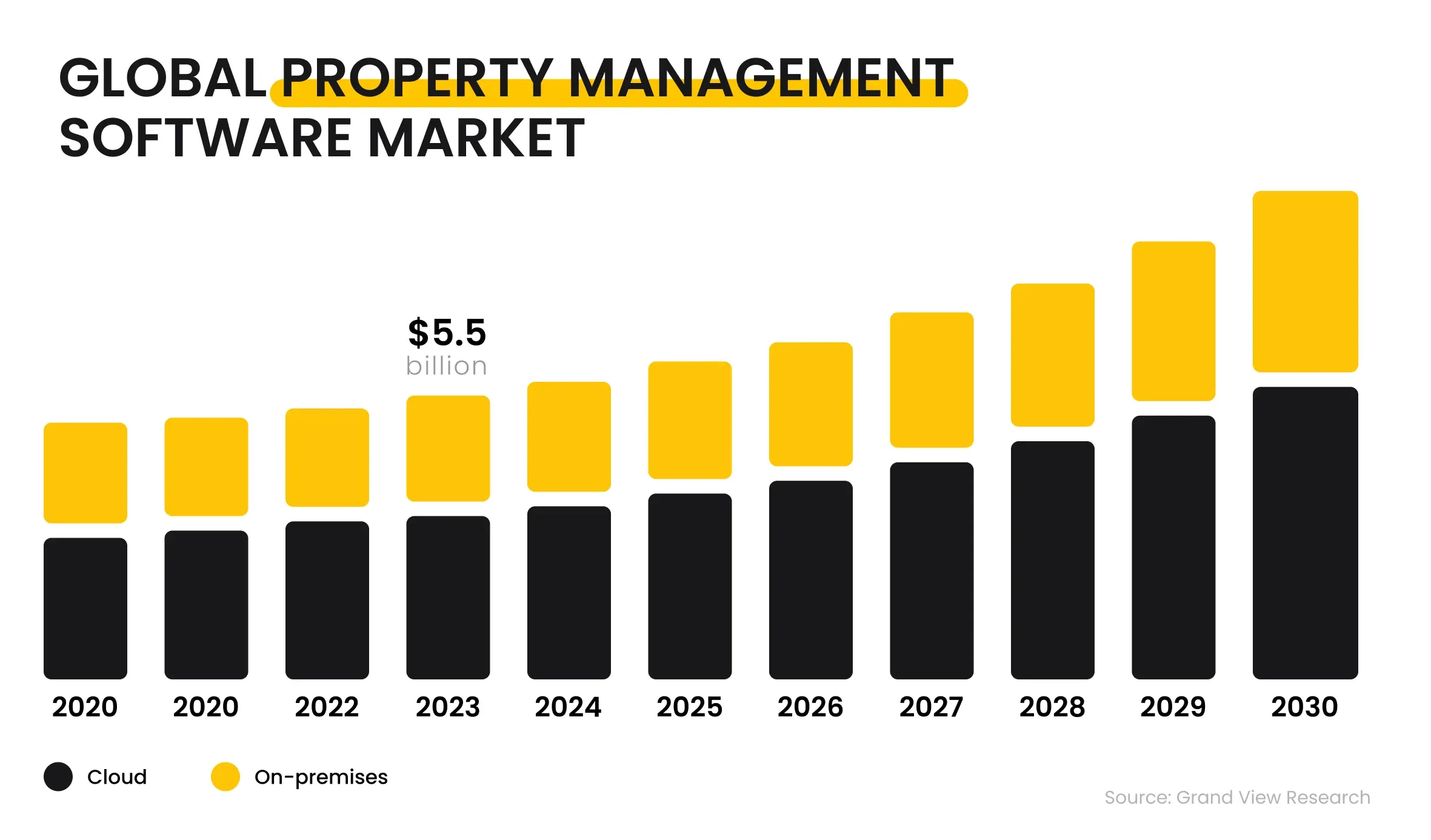
For instance, according to recent reports by Grand View Research, the global property management software market is expected to reach 570 billion US dollars in 2030. What are the reasons for the popularity of real estate software adoption among property managers? To answer this, we must first learn more about the offered benefits and key features of real estate management software.
Key Functionalities of Property Management Software Development
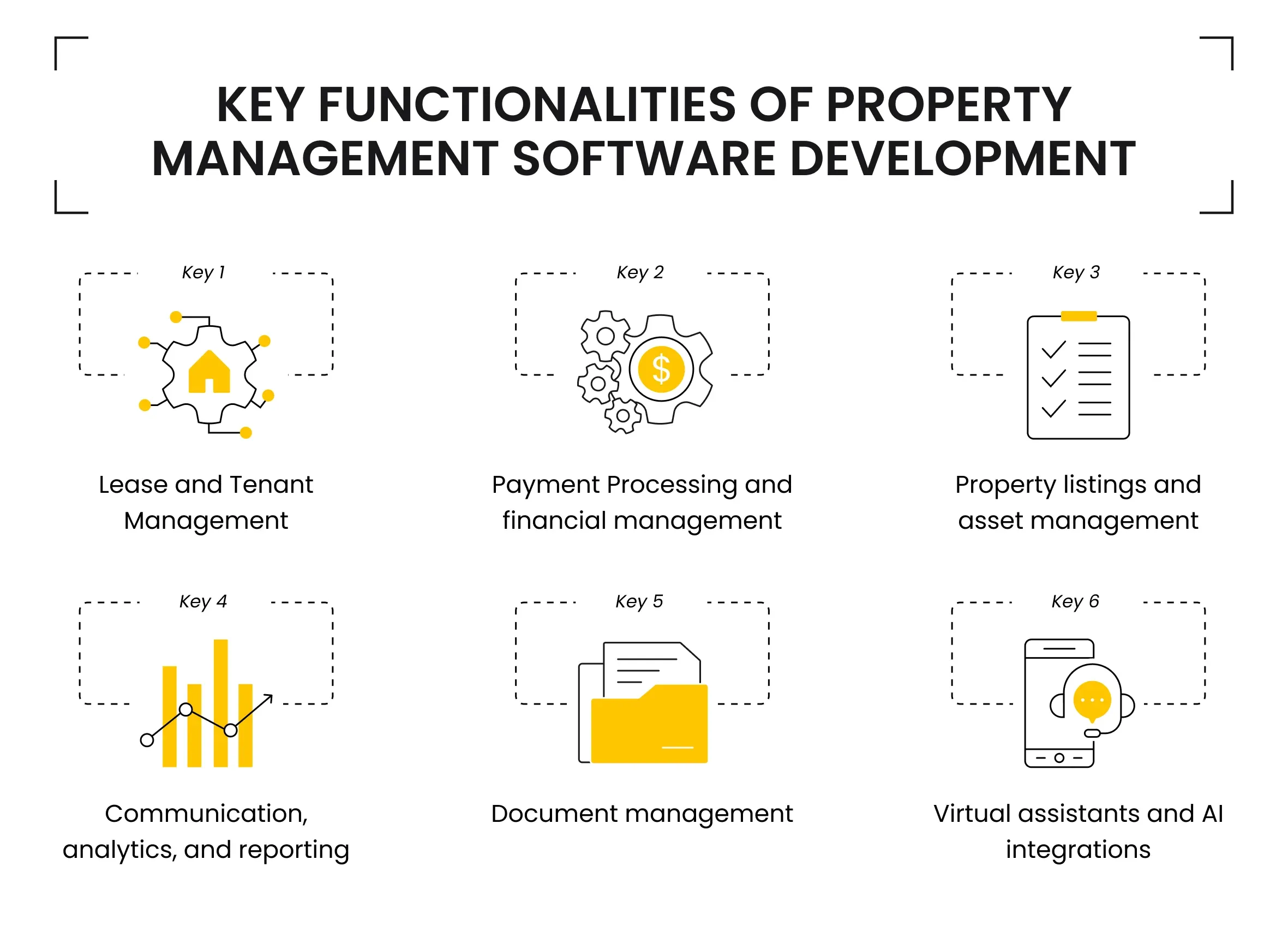
Software solutions can offer many advantages and valuable benefits for each company. However, if we are talking about using them in the real estate business, we can highlight a few core functionalities:
- Lease and Tenant Management
- Payment Processing and financial management
- Property listings and asset management
- Communication, analytics, and reporting
- Document management
- Virtual assistants and AI integrations
Lease and Tenant Management
Clearly, one of the core reasons to integrate software for property management is to streamline and enhance the efficiency of controlling and tracking your real estate assets or related processes.
For instance, such software allows property owners to manage and track their property portfolios. Apart from simple asset monitoring, such systems can gather and analyze tenants' information, help profile candidates, and track their payments, such as lease to rent.
Financial operations management and processing are among the core reasons for using software in this field. Thanks to excellent data processing capabilities and accurate calculations, software solutions significantly speed up processes such as lease management, covering key stages or metrics.
Payment Processing and Financial Management
Apart from informing property managers about payment updates or other financial aspects, property management software can provide companies and their customers with more secure and efficient payment methods.
For instance, management companies can integrate payment gateways to streamline in-app rent collection, leasing payments, etc. Thus, both parties can benefit from a transparent, accurate, and secure way to transfer money and pay the bills.
Another advantage of such built-in functionality is the overall simplicity of integrating it. All software product development services can cover such needs by integrating reliable API solutions. This requires just a little coding and general software knowledge.
Besides, streamlined in-app rent collection is not the only available functionality. You can create the best property management software with multiple features based on data sharing and updating, combining it with a simplified rent payment processing procedure.
So, the tenants get a helpful feature that helps them pay the bills on time, while the facility management company gets access to more accurate and up-to-date information.
Automated rent collection is not the only financial service offered by custom property management software solutions. Thanks to payment processing capabilities, such functionality is possible.
Payment processing is a more complex service that can cover many other operations, such as leasing or buying property or working as an internal accounting software solution for businesses.
Long story short, financial management and monitoring are among the key benefits of developing a property management platform. Using property management software for financial data processing and tracking offers more options for businesses to stay aware and well-informed about the available and gained resources.
Property Listing and Asset Management
The property management system assumes it offers features for improved assent and property administration.
Despite property management software's overall efficiency and multi-purpose use cases, its primal goal is to manage properties. In other words, property accounting is a great but additional feature. The core functionality of such software is instruments and services for enhanced property asset management.
One of the most crucial industry-specific services is the listing of the property. Long story short, such functionality is data lists that consist of up-to-date information on available property assets for rent or buying. Property listings are constantly updated and shared between landlords and property managers to keep them informed about residential and commercial properties they can offer to customers.
Prop listings usually consist of files or presentations with the most critical information about the property object. Yet, custom property management tools can streamline preparing and sharing such listings faster and more conveniently, making them one of the core built-in features.
Besides, apart from informing various real estate companies and agents, built-in property listings can be used for improved real estate asset management:
Property management companies will already have all vital information in their system, profiled and linked to related aspects. They should only monitor changes and get involved if necessary.
Communications, Analytics, and Reports
Every property management business relies heavily on communication efficiency, especially internal analytics and reports. Therefore, one of the core modern features of for-sale or rental property management software is incorporating ways to interact in-app.
Kanban desks, chat options, calendars with in-app calls, or any other functionality that corresponds with the business needs and expectations.
Property managers also need tools to gather and process data. Thus, any efficient property management software depends on built-in instruments for data analysis. Fortunately, data processing services are a widespread option that any real estate software development company can deliver. However, it is preferred to work with niche-experienced developers who are familiar with your industry.
Such cooperation is more beneficial because the management functionality they offer is based on their experience in the field, i.e., they are more familiar with the industry and its needs.
To summarize, built-in communication options, data processing and analysis instruments, as well as reporting are among the most essential property management features.
Documentation Management
Real estate professionals deal with documentation daily. So, they need software solutions and all other useful supplemental tools to cover certain documentation-related operations.
The software can help systemize and streamline documentation operations, ensure storage and gathering, profile, link, update, etc.
Still, the specifics of documentation management are highly individual, so software developers and business owners should discuss them during the project planning stage.
Virtual Assistants and AI Integration
Finally, the artificial intelligence revolution, with its benefits to any software application in terms of open-source cooperation, made it impossible to ignore AI-driven software functionality.
Besides, modern artificial intelligence models are highly flexible and can be adjusted to any needs and requirements regarding your niche or industry. As a result, AI integration for property software offers too many possibilities, making it one of the best software-related investments.
AI-driven real estate solutions can automate multiple tasks and processes, suggest changes and improvements, enhance vital operations, and positively impact investment management.
Custom Property Management Solutions vs. SaaS Solutions
After learning about the key features of property software, we should also discuss the types of such solutions. Many overall software applications and potential ways to enable the mentioned features exist. Still, it is possible to define two core approaches to adopting software used in the real estate business:
- Maintain a full-fledged custom software development project when you and your software partners define all the aspects and factors of the future system, have complete control over the development process, and integrate changes after the software is published.
- Choosing the most suitable ready-made solution by examining software reviews, offered services and features, price, and scalability plan. In other words, choosing the Software-as-a-Service approach.
Each of these approaches has significant advantages balanced by challenges and issues.
Judging from our experience, we recommend that our clients try out the most suitable SaaS first. They will face limitations and imperfections, yet they will learn how such systems work and what features they need.
After that, they can maintain custom software development while still running SaaS so as not to interfere with or stop the business operations. Eventually, in the final stages of software development, they can gradually transfer to their own custom online property management software.
Pros of Custom Property Management Software Development
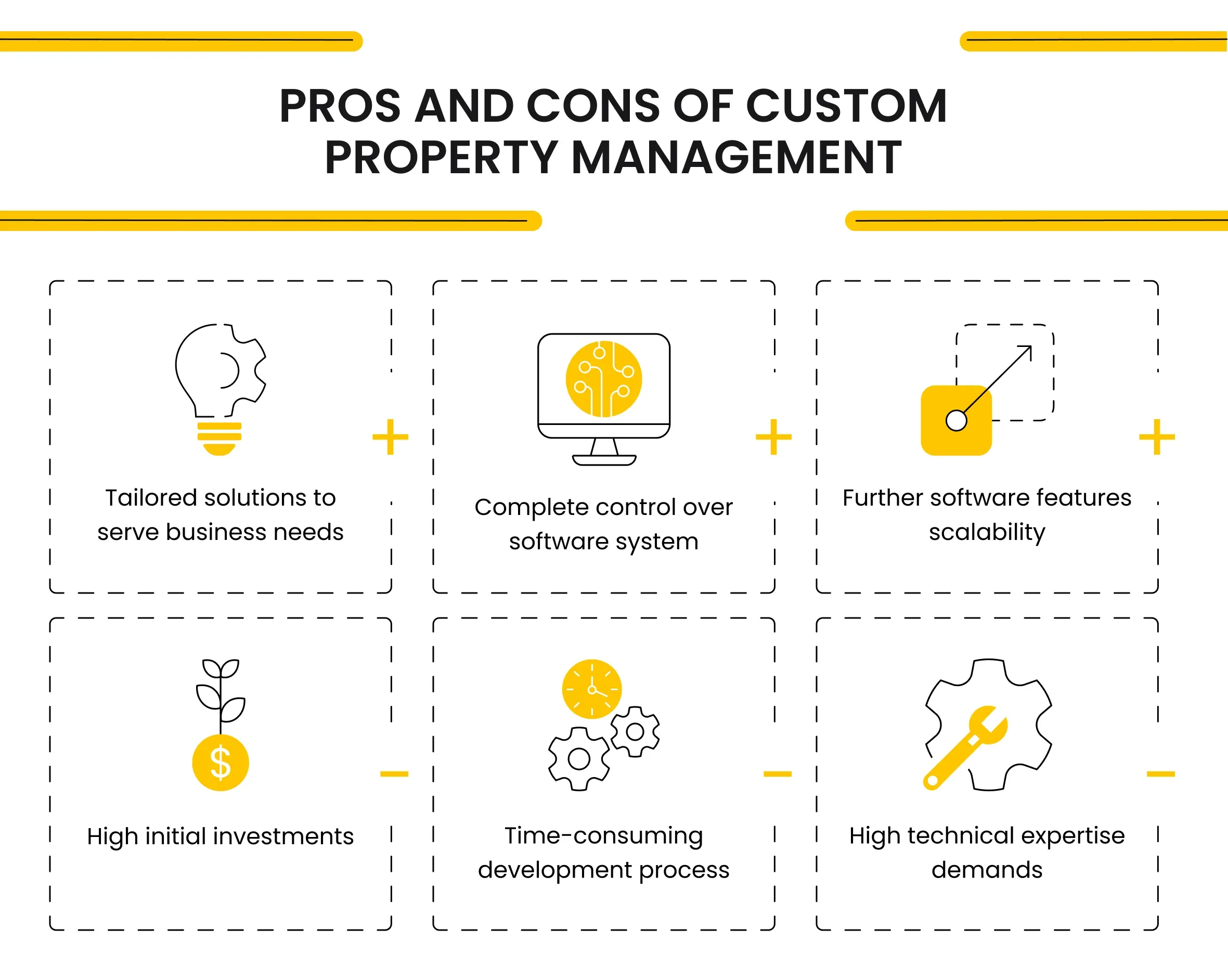
Like any other custom project, it offers the most personalized solutions. Custom projects almost always take place from scratch. Thus, all parties involved in software development can participate in future software discussions, stating their perspectives and opinions.
As a result, developers are provided with the most detailed software requirements and expectations, knowing what and how they should embody to meet these business needs.
Starting the project from scratch also gives an essential yet challenging advantage: your dedicated software team can design and implement it step-by-step, applying the best coding practices and ensuring the code structure meets the goals. However, such a gradual development approach requires much more time and resources than simple API or SaaS incorporation into your business.
Simply put, the core benefits of custom real estate management solutions include:
- Tailored and personalized product for your specific business case that satisfies as many business needs and expectations as possible.
- As a client of software development services on demand, you own the code structure and other elements forever. So, you can scale your software, adjust it, improve it, or do whatever you want after the project ends. To rephrase, you have complete control over the software system.
- Combining previous advantages brings another powerful benefit: the possibility of further scaling and functionality improvement in the future. Reliable, dedicated developers will ensure the system can be scaled, while complete control over software allows you to perform further upgrades when needed.
Cons of Custom Property Management Systems
Nevertheless, custom software development projects also have some crucial drawbacks worth taking into account:
- Such projects are very demanding and require a vast initial budget. Apart from hiring developers and paying their salaries, you should also remember that a system won't bring profits until it is developed. Besides, software projects are commonly accompanied by extra expenses like certified software tools, third-party services, server maintenance, etc.
- Creating new property management software from scratch is a time-intensive process. You should be prepared that such a project might take a few months to a few years, depending on the complexity of the set goals. Moreover, apart from being unable to use the software under development, you will most likely have to use third-party solutions during this time, spending even more money.
- Eventually, custom software development becomes a complex process requiring the highest technical expertise possible. The first challenge is to find an experienced team of developers capable of delivering the expected results. The higher the expertise, the higher the salary. So, finding the perfect balance between all these factors is challenging.
Pros and Cons of SaaS Property Management Operations Solutions
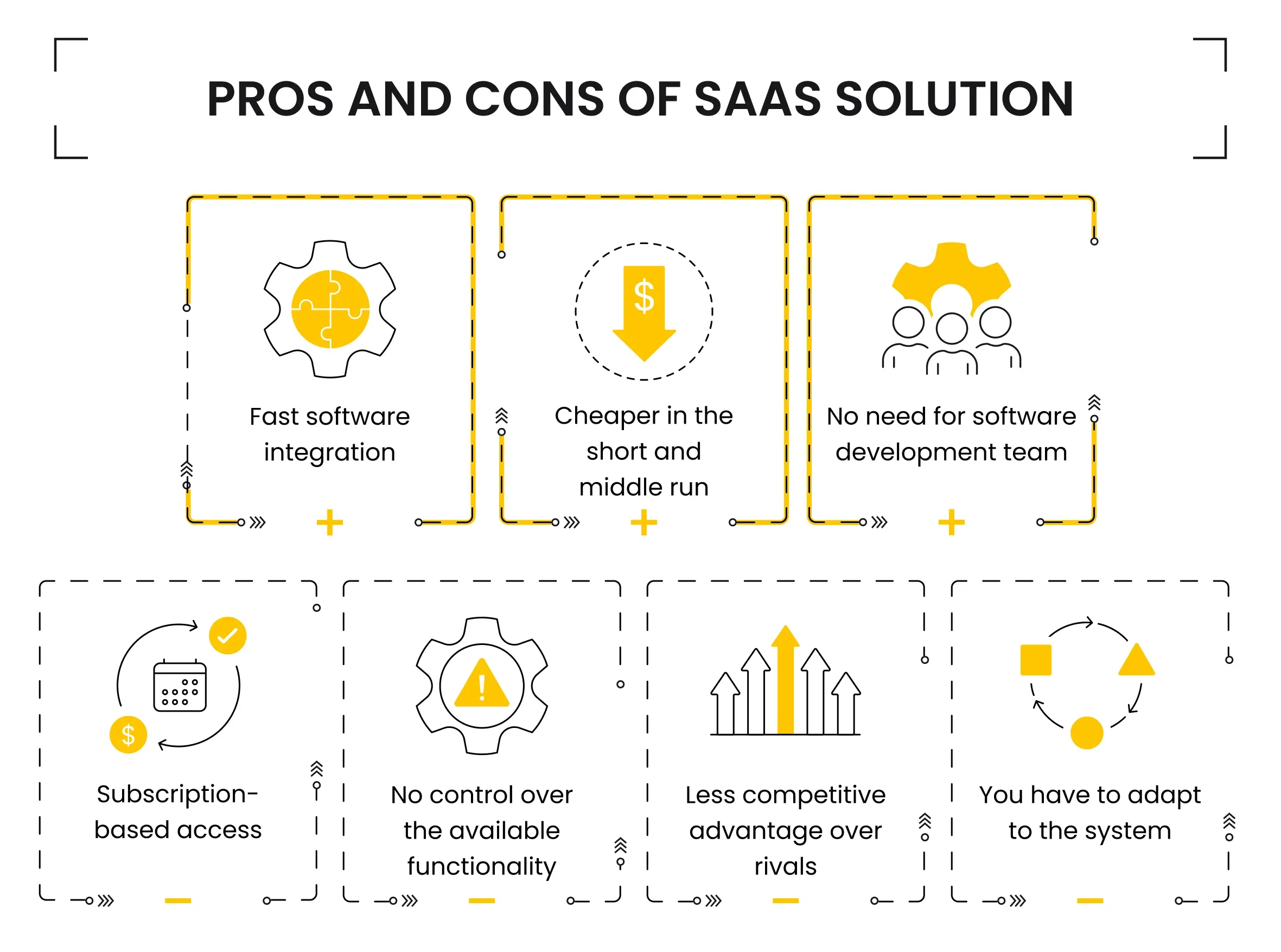
Software-as-a-service solutions are very convenient for many businesses that want to use software for their needs without maintaining full-fledged development on their side. Simply put, choosing SaaS property management software allows to:
- Quickly incorporate software. Integration of SaaS takes a few days at most. So, if such solutions are urgent, your company can choose the most convenient services and start working with them immediately.
- Reduce expenses in the short and middle term. Despite paid access, using third-party cloud-based software is much cheaper in the short term compared to the initial development budget from scratch. So, you can save costs if you require short-term management solutions for your property business.
- Avoid hiring developers. SaaS is ready-made software that is distributed as a service. So, you don't need a tech team to integrate and operate such systems in your business. So, you can save the time and effort required to look for experienced software engineers and cut the expenses for their salaries.
Talking about the limitations and challenges of SaaS, we should mention:
- Subscription-based access, which brings constant expenses when using the software.
- You have no control over the available functionality, which limits your possibilities of scaling or improving code-based systems or accessing new features.
- Less competitive advantage over rivals because the same features and services are accessible to anyone, including your competitors. Using conventional services available for anyone brings no competitive advantage to your company.
- You must adapt to the systems' specifics, not vice versa. Unlike custom software, SaaS systems are not tailored to each business's needs. So, your company must adjust to the potential limitations or other inconveniences.
How Property Management Software Solves Key Industry Challenges?
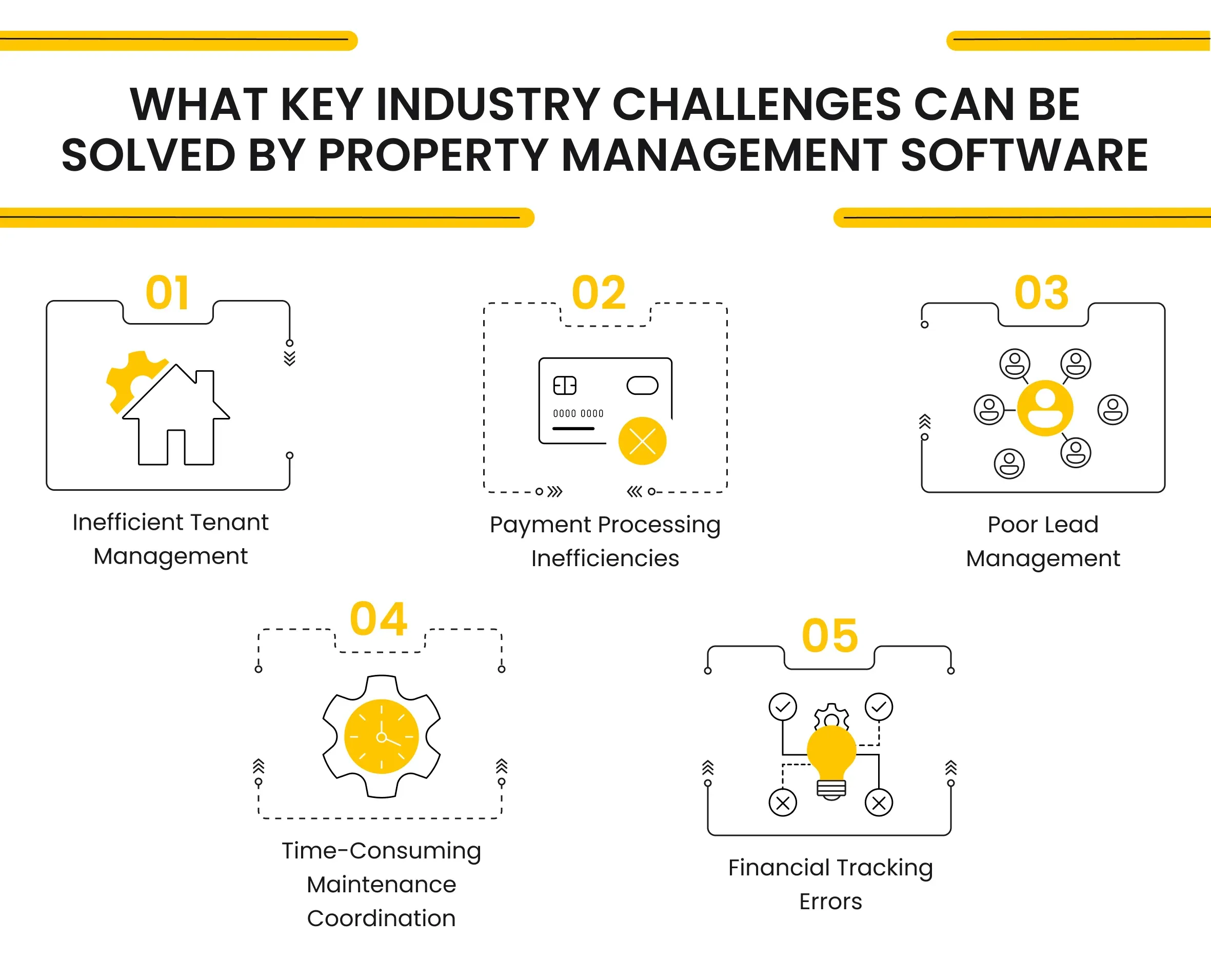
Finally, let's briefly talk about the key issues many property businesses face that can easily fixed by even the most basic cloud-based property management software. The list of such problems the software helps to overcome includes:
- Inefficient Tenant Management
- Payment Processing Inefficiencies
- Poor Lead Management
- Time-Consuming Maintenance Coordination
- Financial Tracking Errors
As we explained before, software like PMS systems suggests multiple management tools that cover almost all business-related operations and processes.
Even basic property management software streamlines tasks such as tenant data gathering, payment processing and reporting, marketing, sales and lead management, error tracking, etc.
However, apart from that, thanks to software instruments, property managers and landlords can automate and speed up maintenance management and coordination, gathering all necessary reports and updates on each asset and knowing what should be replaced or improved.
How Can Incora Help You Property Management Software Development?
So, suppose you are interested in developing a leading property management software designed to meet your needs and expectations but are confused about finding a reliable development team. In that case, we can suggest our services and technical expertise.
Our internal Incora software development team has extensive experience creating tailored software for the real estate industry. Our developers are niche-experienced and can advise on many other topics related to industry-specific software. For more information, please check our recent case studies.
What’s your impression after reading this?
Love it!
1
Valuable
1
Exciting
1
Unsatisfied
1
FAQ
Let us address your doubts and clarify key points from the article for better understanding.
How does property management software help reduce costs?
Property management software helps reduce costs by automating tasks like rent collection, maintenance requests, and tenant communication, reducing administrative labor. It also minimizes errors, improves efficiency, and provides data-driven insights to optimize expenses and prevent costly issues.
How does AI improve property management software?
AI improves property management software by automating tasks like tenant screening, maintenance scheduling, and rent collection. It enhances decision-making with predictive analytics, improves customer service with chatbots, and detects anomalies to prevent costly issues.
Can property management software integrate with other systems?
Yes, property management software can integrate with other systems like accounting software, CRM platforms, payment processors, and smart home technology, improving efficiency and streamlining operations.
YOU MAY ALSO LIKE
Real Estate App Development vs Web Development: Which is Right for Your Business?
Let’s talk!
This site uses cookies to improve your user experience. Read our Privacy Policy
Accept

Share this article